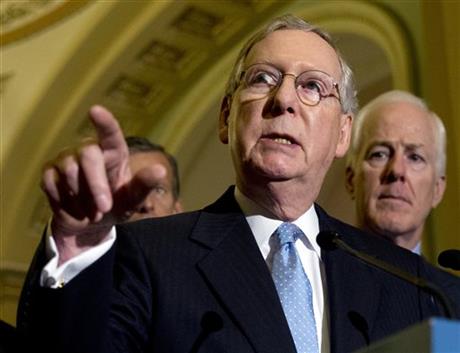
Senate Majority Leader Mitch McConnell of Kentucky and other congressional leaders expressed doubts Sunday about a historic agreement with Iran to address that country's nuclear program.
They predicted President Barack Obama could face hurdles in Congress if negotiators reach a final deal.
McConnell spoke minutes after diplomats said on Sunday that negotiators at the Iran nuclear talks were expected to reach a provisional agreement to curb the country's atomic program in return for tens of billions of dollars in sanctions relief. Secretary of State John Kerry has been leading the U.S. delegation in the talks in Vienna, which aims to impose long-term, verifiable limits on Tehran's nuclear programs.
"This is going to be a very hard sell for the administration," McConnell said on "Fox News Sunday" when asked about the likelihood of Congress signing off on a deal.
President Barack Obama has come under criticism from members of Congress and some U.S. allies in the Middle East who say the administration has conceded too much in the Iran talks. Iran has denied any nuclear weapon ambitions and said its program is meant to supply domestic energy and other peaceful purposes.
The current negotiations have run more than two weeks and blown through three deadlines. Because the talks are in overtime, Congress will have 60 days to assess the deal, requiring Obama to await that review before easing sanctions agreed to in a deal.
During those two months, lawmakers could try to build a veto-proof majority behind new legislation that could impose new sanctions on Iran or prevent Obama from suspending existing ones.
Sen. Bob Corker, the chairman of the Senate Foreign Relations Committee, said lawmakers would review any agreement carefully to ensure the Iranians are held accountable and that any violations can be enforced.
"At the end of the day I think people understand that if this is a bad deal that is going to allow Iran to get a nuclear weapon, they would own this deal if they voted for it, and so they'll want to disapprove it," said Corker, R-Tenn. "On the other hand, if we feel like we're better off with it, people will look to approve it."
Sen. Ben Cardin, the committee's ranking member, acknowledged the long, difficult work of negotiators and said that Congress has a rigorous task ahead, as well.
"In our deliberations we need to ensure the negotiations resulted in a comprehensive, long-lasting, and verifiable outcome that also provides for snap-back of sanctions should Iran deviate from its commitments," the Maryland Democrat said in a statement on Sunday. "If an agreement is achieved, Congress faces a solemn charge in reviewing the deal which I expect will be fulfilled to the best of our abilities and at the highest of standards."
Obama downplayed chances for an Iran nuclear deal during a closed-door meeting with Senate Democrats last week, telling participants that an agreement was at best a 50-50 proposition.
McConnell said a resolution of disapproval is likely to be introduced in the Senate and predicted it would pass with more than 60 votes. If Obama vetoed the resolution, McConnell noted that the president would need 34 votes, or more than one-third of the Senate, to sustain it.
